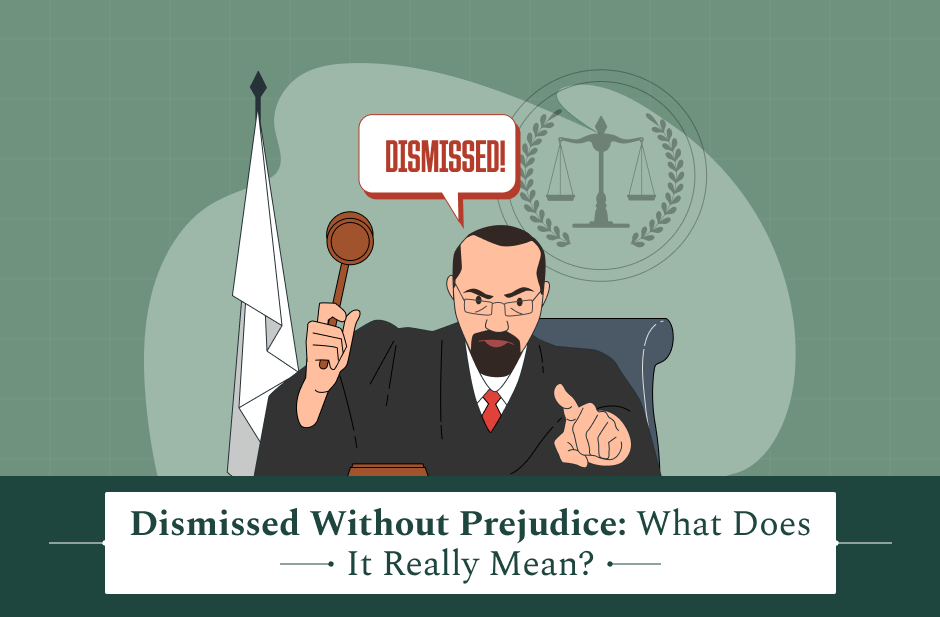When someone hears that their case was dismissed without prejudice, it might sound scary or confusing. Does that mean the case is over forever? Is it a good thing or a bad thing?
If you’ve asked yourself these questions, don’t worry—you’re not alone.
In this blog, I will simplify the jargon for you to understand plainly the legal term and the forthcoming stages.
Do you know that legal words could sound strange like they are very large, but in fact they are not?
Imagine “dismissed without prejudice” as pausing the video instead of pressing the stop button. The court has not made a decision to leave your case. It only means that at a later time it might return.
If you are interested to know these, keep on reading till the end…
What is Dismissed Without Prejudice?

A dismissal without prejudice indicates that the case is not closed; hence, the person who initiated the lawsuit (usually the plaintiff) may bring the action anew.
It’s similar to when you’re playing a game and something bad happens so, you suspend it for now, but there is still a chance of a rematch in given time.
To illustrate, suppose someone brings a legal claim to a court. Yet, perhaps, they have omitted very important documents, or they have not complied with the procedure of court jurisdiction.
If the judge says, “I understand that. We put the case to one side for a moment, but if the case is rearranged correctly, then the plaintiff may initiate the case.”
In such a case, it is “without prejudice,” meaning it is not final.
Think of it this way:
- Without prejudice = Try again later
- With prejudice = No more chances
When is a Case Dismissed Without Prejudice?
A judge can dismiss a case without prejudice for many small reasons. Sometimes, it happens because of a mistake in filing the case. Other times, the person who brought the case may have asked the court to pause it.
Here are some common reasons:
- Plaintiff didn’t fill out the paperwork properly.
- Case was filed in the wrong court.
- Lawyer or person bringing the case wasn’t ready yet.
- The parties are trying to settle the case outside of court.
Judges allow this form of a case to be dismissed without prejudice to give people a fair chance to correct simple errors or try another legal path.
How Many Times Can a Case be Dismissed Without Prejudice?
There is no rule of thumb on this matter, though courts generally are not fond of people who keep filing the same case and want to prevent this situation by implementing some limits.
According to most jurisdictions, if your lawsuit has been dismissed without prejudice, you may file the same suit again once or twice and only if the reasons are solid enough, you will still have your right to resubmit the case.
Of course, unless the court doesn’t suspect the plaintiff of playing the system, for example, by filing a new lawsuit and fixing nothing, and in such a case the court is likely to dismiss the case with prejudice, that is, finally, the case cannot be brought up again.
Then, under the circumstance of your case being dismissed without prejudice, you must seriously take the action of solving the matter first, and then you can think of a refill.
What to Do When Your Case Is Dismissed Without Prejudice?
If your case is dismissed without prejudice, it is not the end of the world. Just do the following:
- Look through the court order: Most of the time, the judge will tell you why your case was dismissed.
- Fully rectify the issue: If it was something like a black dot on the paper, a document that was not included, or wrong court, you can really make it right.
- Seek the help of a legal representative: Such a specialist is capable of pinpointing the causes of your failure and suggesting possible measures to avoid them in the future.
- Write a new complaint: Provided everything has been fixed in your matter, you can be given back your documentation, then it is possible to bring another action by filing a lawsuit with the same court, or, if it wasn’t the one, the correct one.
In other words, you can go for an alternative. However, a must-follow requirement is that the second attempt must be well-prepared. Otherwise, it is not worth your effort.
Can You Reopen a Case If It Was Dismissed Without Prejudice?
Yes, you can. That’s the main point of “without prejudice.” It means your case is not dead—it’s just paused. But you can’t reopen it forever.
You’ll have to act within a certain time (I will talk about that next). You usually don’t reopen the exact same case file—you refile it, which means you start the case again from the beginning, but with the right steps this time.
Reopening (or refiling) doesn’t guarantee you’ll win the case, but it gives you another shot to be heard in court.
What is the Statute of Limitation for a Case Dismissed Without Prejudice?
For each category of legal disputes, there is a statute of limitations. This is just a way of saying that a time limit has been set.
It is from the time the issue has arisen that you have a period to bring your complaint to the court.
If your case is dismissed by the court without prejudice, you still have the opportunity to present it again. However, this is only possible if you remain within that deadline.
For instance:
- Suppose you want to take legal action against someone for violating the terms of the contract. Perhaps, in this case, it will be 4 years that you are allowed to sue the person.
- Perhaps you are a victim of a traffic accident. Then you may be allowed two years to file a lawsuit.
Take a situation when you file the case, and after one year of the court’s dismissal without prejudice, you decide you still want to start the case.
You may still do it provided the deadline has not yet arrived (e.g. in the original 2 or 4 years). However, after the expiration, no matter what the reason for the situation is, you will not be able to bring the case back again.
Furthermore, it is always important that you take note of the important dates and deadlines. Moreover, at the brink of your deadline, it is imperative that you are swift in acting upon it.
What is Dismissed With Prejudice?

So let’s now understand what dismissed with prejudice means.
A case dismissed with prejudice is final with no recourse. You are barred from a retrial, and the court will say, “We gave you a chance, no going back.”
Under what circumstances would a case be dismissed with prejudice? Below are some reasons that are usually cited:
- The judge is of the opinion that the case has no merit in law.
- It is the plaintiff who has violated the rules or manipulated the court process.
- It was a res judicata case, i.e., the issue was already decided, e.g.., suing the same person for the second time.
This form of dismissal is really a safeguard that people are not harassed in court repeatedly for the same problem. It is definitively and more restrictively than a dismissal without prejudice.
This means that if your case is dismissed with prejudice, in most cases, you are not allowed to file it again. Knowing the difference between the dissmisal types is crucial.
Your Legal Guide: Is a Case Dismissed Without Prejudice Good or Bad?
So, is being dismissed without prejudice good or bad? The answer depends on how you look at it. TBH, it’s not the end of the road—it’s more like a yellow light, not a red one.
- Good news? You can try again. You get another chance to fix mistakes and refile your case.
- Bad news? You need to act quickly before the legal deadline (the statute of limitations) runs out. If you wait too long, you lose the chance forever.
If your case gets dismissed without prejudice, it’s a wake-up call—not a full stop. It’s your opportunity to get it right the second time. Don’t ignore it, and don’t give up.
Helpful Tip: Talk to a lawyer if you’re not sure what to do. They can guide you, explain what went wrong, and help you refile the case correctly.
In the end, “dismissed without prejudice” is not something to fear—it’s something to understand and learn from.
Read Also:
















